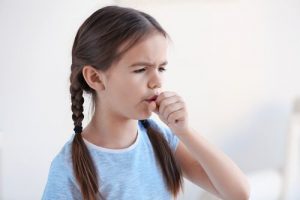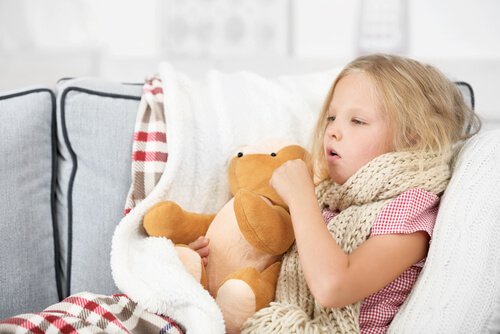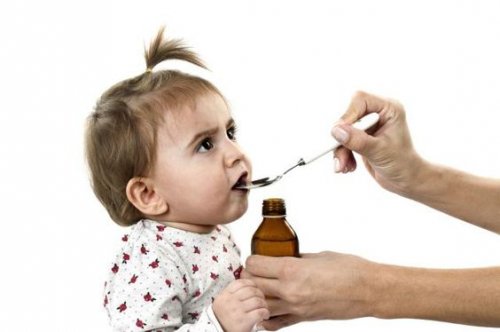How to Identify the Type of Cough Your Child Has

In little ones, a cough is a symptom of a natural body reaction and is very common during respiratory infections. We’ll use the following article to help you identify the type of cough your child has and how to treat it.
The first thing you should keep in mind is that children suffer constant episodes of infection in their airways that can cause coughing. That’s why it’s a very common situation, especially in urban areas due to air pollution or exposure to spaces with smoke and cold air, among others.
A natural defense mechanism
Coughing is a pulmonary defense mechanism that allows unwanted substances and irritants to be expelled from the respiratory tract. It’s activated in response to irritation caused by an external agent, such as cold air.
As in the elderly, children can manifest a cough in many ways, although the two most common types are dry cough and wet cough. Next, we’ll analyze the main aspects of each.
What could be causing your child’s cough
- Chronic respiratory diseases such as asthma
- Ingestion of some medication
- Stomach problems
- Infections or sinusitis
- An irritation

Identifying the type of cough: wet or dry
How to identify a dry cough
A dry or irritated cough is typical of an inflamed larynx and is easy to identify, because unlike a wet cough, it doesn’t produce mucus. In addition, it’s sometimes accompanied by a lost voice.
In some cases, dry cough is painful and is accompanied by burning and a strange sensation in the body. It can affect the child day and night, although it usually manifests itself during the day.
This type of cough is caused by irritation of the throat and lungs. In most cases, the problem comes from a benign infection. In other cases, it arises from a bacterial infection.
Dry cough in children is usually due to colds, air pollution or some small allergy. Therefore, you shouldn’t be excessively alarmed.
In a few days, this type of cough generally becomes wet and, as a result, the breathing difficulty disappears. Also, it’s very important for the child to drink plenty of water or hot drinks to dissolve the mucus and facilitate the transformation process.
If, on the other hand, the cough is still very persistent, it’s likely an acute inflammation of the trachea or pharynx, or the phlegm may be too solid to be expelled to the outside.
“Cough is a pulmonary defense mechanism that allows unwanted substances and irritants to be expelled from the respiratory tract.”
How to identify a wet cough
A wet cough is also known as a productive cough due to the abundant presence of phlegm, produced mainly in the bronchi in the lungs. In general, when the phlegm is expelled, the cough stops.
This type of cough confirms that there are secretions in the respiratory tract, coming out in the throat and lungs, although there is no irritation.
Certainly, many moms are scared of a wet cough, perhaps due to the sound that characterizes it. However, it doesn’t necessarily mean that the child has an infection. Actually, it represents the beginning of healing, because mucus cleans the airways and also expels viruses and bacteria that get trapped.
The causes are usually related to colds, the flu or inflammation in the respiratory tract. In general, a wet cough takes a long time to heal and requires at least 4 to 5 days of recovery.

When you should visit the doctor
Children with a cough require special attention due to possible associated symptoms. In children, the use of medications to suppress a cough should be preferably done under medical supervision.
If your child is younger than 6 years old, it’s necessary to consult a health professional to adopt the appropriate treatment.
In any case, the following symptoms will determine when you should visit the doctor, regardless of the type of cough your child has:
- Trouble eating or breathing
- Unusual behavior (discomfort, pain)
- The cough is accompanied by a fever
- Other symptoms appear, such as diarrhea, vomiting, rash, etc.
- The cough persists for more than three days without improvement
- The child’s lips turn blue
- Noisy breathing
- There is a possibility that the child inhaled an object.
Finally, you should bear in mind that the main physiological difference between the type of cough children have is the presence of phlegm.
Whatever the cause, it’s always advisable to consult a specialist, especially if the cough persists for more than 8 days or produces a fever higher than 100.4 degrees Fahrenheit.
In little ones, a cough is a symptom of a natural body reaction and is very common during respiratory infections. We’ll use the following article to help you identify the type of cough your child has and how to treat it.
The first thing you should keep in mind is that children suffer constant episodes of infection in their airways that can cause coughing. That’s why it’s a very common situation, especially in urban areas due to air pollution or exposure to spaces with smoke and cold air, among others.
A natural defense mechanism
Coughing is a pulmonary defense mechanism that allows unwanted substances and irritants to be expelled from the respiratory tract. It’s activated in response to irritation caused by an external agent, such as cold air.
As in the elderly, children can manifest a cough in many ways, although the two most common types are dry cough and wet cough. Next, we’ll analyze the main aspects of each.
What could be causing your child’s cough
- Chronic respiratory diseases such as asthma
- Ingestion of some medication
- Stomach problems
- Infections or sinusitis
- An irritation

Identifying the type of cough: wet or dry
How to identify a dry cough
A dry or irritated cough is typical of an inflamed larynx and is easy to identify, because unlike a wet cough, it doesn’t produce mucus. In addition, it’s sometimes accompanied by a lost voice.
In some cases, dry cough is painful and is accompanied by burning and a strange sensation in the body. It can affect the child day and night, although it usually manifests itself during the day.
This type of cough is caused by irritation of the throat and lungs. In most cases, the problem comes from a benign infection. In other cases, it arises from a bacterial infection.
Dry cough in children is usually due to colds, air pollution or some small allergy. Therefore, you shouldn’t be excessively alarmed.
In a few days, this type of cough generally becomes wet and, as a result, the breathing difficulty disappears. Also, it’s very important for the child to drink plenty of water or hot drinks to dissolve the mucus and facilitate the transformation process.
If, on the other hand, the cough is still very persistent, it’s likely an acute inflammation of the trachea or pharynx, or the phlegm may be too solid to be expelled to the outside.
“Cough is a pulmonary defense mechanism that allows unwanted substances and irritants to be expelled from the respiratory tract.”
How to identify a wet cough
A wet cough is also known as a productive cough due to the abundant presence of phlegm, produced mainly in the bronchi in the lungs. In general, when the phlegm is expelled, the cough stops.
This type of cough confirms that there are secretions in the respiratory tract, coming out in the throat and lungs, although there is no irritation.
Certainly, many moms are scared of a wet cough, perhaps due to the sound that characterizes it. However, it doesn’t necessarily mean that the child has an infection. Actually, it represents the beginning of healing, because mucus cleans the airways and also expels viruses and bacteria that get trapped.
The causes are usually related to colds, the flu or inflammation in the respiratory tract. In general, a wet cough takes a long time to heal and requires at least 4 to 5 days of recovery.

When you should visit the doctor
Children with a cough require special attention due to possible associated symptoms. In children, the use of medications to suppress a cough should be preferably done under medical supervision.
If your child is younger than 6 years old, it’s necessary to consult a health professional to adopt the appropriate treatment.
In any case, the following symptoms will determine when you should visit the doctor, regardless of the type of cough your child has:
- Trouble eating or breathing
- Unusual behavior (discomfort, pain)
- The cough is accompanied by a fever
- Other symptoms appear, such as diarrhea, vomiting, rash, etc.
- The cough persists for more than three days without improvement
- The child’s lips turn blue
- Noisy breathing
- There is a possibility that the child inhaled an object.
Finally, you should bear in mind that the main physiological difference between the type of cough children have is the presence of phlegm.
Whatever the cause, it’s always advisable to consult a specialist, especially if the cough persists for more than 8 days or produces a fever higher than 100.4 degrees Fahrenheit.
This text is provided for informational purposes only and does not replace consultation with a professional. If in doubt, consult your specialist.








